
Entropy
Scope & Guideline
Bridging disciplines to tackle complex scientific challenges.
Introduction
Aims and Scopes
- Theoretical and Applied Entropy:
Research exploring the fundamental principles of entropy across disciplines, including thermodynamics, statistical mechanics, and information theory. - Complex Systems and Dynamics:
Studies focusing on the dynamics of complex systems, including biological, ecological, and socio-economic systems, emphasizing how entropy influences system behavior. - Quantum Information and Computation:
Investigations into the role of entropy in quantum systems, including quantum information theory, quantum computing, and the implications of quantum entanglement. - Entropy in Data Science and Machine Learning:
Applications of entropy in data analysis, machine learning, and artificial intelligence, including feature selection, model evaluation, and uncertainty quantification. - Entropy and Network Theory:
Research examining the role of entropy in network structures, dynamics, and information flow, particularly in social networks and biological networks. - Entropy in Environmental and Ecological Studies:
Studies that utilize entropy measures to assess ecological diversity, environmental changes, and resource management.
Trending and Emerging
- Entropy in Machine Learning and AI:
There is a growing interest in utilizing entropy as a measure in machine learning, particularly in feature selection, model evaluation, and improving the robustness of algorithms. - Quantum Computing and Information Theory:
Research exploring the intersection of quantum mechanics and information theory is rapidly expanding, particularly regarding entanglement, quantum states, and their implications for computational efficiency. - Entropy in Health and Biological Systems:
Emerging studies are applying entropy concepts to health sciences, particularly in understanding complex biological processes and the dynamics of health-related data. - Environmental Applications of Entropy:
Research on the application of entropy measures in environmental science and ecology is trending, particularly in assessing biodiversity, climate change impacts, and resource management. - Complex Networks and Entropy:
The exploration of entropy within complex networks, including social networks, biological systems, and financial markets, indicates a significant trend towards understanding the dynamics and structure of these networks.
Declining or Waning
- Classical Thermodynamics:
Research specifically focused on classical thermodynamic principles appears to be waning as the field shifts towards more complex systems and interdisciplinary approaches. - Basic Information Theory:
While information theory remains a core theme, the focus on foundational concepts without interdisciplinary applications has declined in favor of more applied and complex analyses. - Traditional Statistical Mechanics:
The application of traditional statistical mechanics concepts in isolation is less frequent, with a growing preference for integrating these ideas into broader frameworks involving complex systems or quantum mechanics. - Entropy in Simple Systems:
Research that deals with entropy in overly simplified systems or models is becoming less common, as there is a clear trend towards studying more complex, real-world systems.
Similar Journals
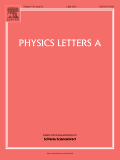
PHYSICS LETTERS A
Catalyzing Academic Exchange in PhysicsPhysics Letters A is a renowned scientific journal published by Elsevier, dedicated to the field of physics and astronomy. Established in 1963, it has continuously evolved, offering a platform for the swift dissemination of significant research findings in various branches of physics. As of 2023, it holds a commendable Q2 ranking in the category of Physics and Astronomy (miscellaneous) and ranks 69th out of 243 journals in the same domain according to Scopus, positioning itself in the 71st percentile of academic impact. With its comprehensive scope, Physics Letters A provides a vital resource for researchers, professionals, and students, facilitating academic discourse and advancing knowledge across the field. Although it does not currently offer Open Access options, its rigorous peer-review process ensures high-quality content. It is centrally located in Amsterdam, Netherlands, and continues to be an essential outlet for innovative contributions to the physics community through the year 2024 and beyond.
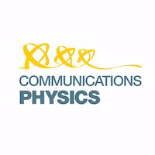
Communications Physics
Connecting disciplines through innovative research.Communications Physics is a premier open access journal published by Nature Portfolio, dedicated to disseminating high-quality research in the field of Physics and Astronomy. Since its inception in 2018, the journal has rapidly established itself as a vital platform for innovative scientific communication, boasting an impressive Impact Factor and achieving Q1 status in the 2023 category of Physics and Astronomy (miscellaneous). With a Scopus rank of #31 out of 243, placing it within the 87th percentile, Communications Physics attracts a global audience of researchers, professionals, and students eager to engage with cutting-edge findings. The journal supports open access, ensuring that research is freely available to the public, which enhances its visibility and encourages broader discussions within the scientific community. Located in Berlin, Germany, Communications Physics aims to bridge the gap between various disciplines within physics, fostering interdisciplinary collaboration and inspiring future research endeavors.
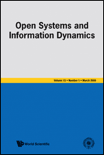
OPEN SYSTEMS & INFORMATION DYNAMICS
Unleashing Knowledge for Collaborative Scientific Discovery.OPEN SYSTEMS & INFORMATION DYNAMICS, published by World Scientific Publishing Co Pte Ltd, is a leading international journal dedicated to advancing research in the interdisciplinary areas of computational mechanics, information systems, and mathematical physics. With its ISSN 1230-1612 and E-ISSN 1793-7191, the journal has established itself as an influential platform for disseminating original research findings, reviews, and methodologies that address complex systems and dynamics. Its current impact factor reflects a solid reputation within the academic community, particularly amongst researchers in the fields of physics, statistics, and computational sciences. The journal's scope encompasses a diverse array of subjects, earning a Q2 classification in Computational Mechanics and Q3 in multiple other categories, including Fluid Flow and Transfer Processes and Information Systems. By providing open access to a wealth of knowledge, OPEN SYSTEMS & INFORMATION DYNAMICS is committed to fostering collaboration and innovation for students, researchers, and industry professionals alike, positioning itself as a cornerstone of scientific exploration and discovery in Singapore and beyond.
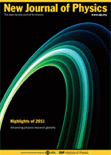
NEW JOURNAL OF PHYSICS
Unveiling the universe, one discovery at a time.NEW JOURNAL OF PHYSICS, published by IOP Publishing Ltd, is a prestigious open-access journal that has been at the forefront of the physics community since its inception in 1998. With an impact factor that places it in the Q1 category of Physics and Astronomy (miscellaneous) and a commendable ranking of #49 out of 243 in the general physics and astronomy category according to Scopus, this journal is recognized for its significant contribution to advancing research in the field. The journal caters to a broad scope of topics, providing a platform for the dissemination of cutting-edge research findings and innovative theoretical explorations. Operating from the United Kingdom, it offers a truly international perspective, making its contents accessible and impactful to a global audience. With robust open-access options, the NEW JOURNAL OF PHYSICS ensures that research findings are freely available, promoting collaboration and knowledge sharing among researchers, professionals, and students alike. This commitment to accessibility, combined with its high-quality content, makes it an essential resource for anyone engaged in the physics community.

Frontiers of Physics
Exploring New Horizons in Physics InnovationFrontiers of Physics, published by Higher Education Press, is a premier open-access journal dedicated to fostering innovative research and excellence within the field of physics. With an ISSN of 2095-0462 and an E-ISSN of 2095-0470, this rapidly growing journal has established itself as a valuable platform for disseminating cutting-edge findings, covering a diverse range of topics from theoretical frameworks to experimental advancements. Notably, Frontiers of Physics has achieved an impressive Q1 ranking in the 2023 Scopus Quartiles for Physics and Astronomy, securing a competitive 5th out of 81 positions in its category, reflecting a high impact factor that underscores its importance to the scientific community. Since its inception in 2011 and continuing through 2024, the journal aims to bridge the gap between academia and industry, encouraging collaboration among researchers, professionals, and students alike. Its commitment to open access ensures that high-quality research is readily accessible, thereby promoting knowledge sharing and advancement in the global physics community. Explore the potential of your research in Frontiers of Physics, where the future of physics flourishes.

INTERNATIONAL JOURNAL OF THEORETICAL PHYSICS
Pioneering Insights in Physics and MathematicsInternational Journal of Theoretical Physics is a premier academic journal dedicated to the advancement of knowledge in the fields of theoretical physics and mathematics. Published by Springer/Plenum Publishers, this esteemed journal has been a vital platform for researchers since its inception in 1968. With an impressive track record and an emphasis on high-quality, innovative research, the journal currently ranks in the third quartile (Q3) in both the Mathematics (Miscellaneous) and Physics and Astronomy (Miscellaneous) categories as of 2023. While the journal is not open access, it offers accessible subscription options for institutions and individuals. The International Journal of Theoretical Physics serves as an essential resource for scholars and practitioners looking to deepen their understanding and contribute to the evolving landscape of theoretical research, making it a key player in nurturing academic discourse and fostering collaboration in its field.

COMMUNICATIONS IN MATHEMATICAL PHYSICS
Fostering Dialogue in the Evolving World of PhysicsCOMMUNICATIONS IN MATHEMATICAL PHYSICS is a premier journal in the realm of mathematical physics, published by Springer and recognized for its rigorous scholarship and comprehensive coverage of the field since its inception in 1965. With an impressive impact factor reflecting its influential contributions—ranking Q1 in both Mathematical Physics and Statistical and Nonlinear Physics—the journal consistently attracts high-quality submissions. It holds notable standings in Scopus, ranked 11th in Mathematical Physics and 12th in Statistical and Nonlinear Physics, marking it as a critical venue for both emerging and established researchers. The journal is dedicated to the dissemination of groundbreaking research and reviews, thereby fostering dialogue and innovation in a constantly evolving discipline. It provides invaluable access to cutting-edge theoretical advancements, making it an essential resource for professionals and students alike engaged in this dynamic field of study.
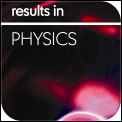
Results in Physics
Connecting Researchers, Elevating PhysicsResults in Physics, an esteemed open-access journal published by ELSEVIER, has been a prominent platform for disseminating cutting-edge research in the field of physics since its establishment in 2011. With its ISSN 2211-3797 and E-ISSN 2211-3797, this journal proudly holds a Q2 ranking in the Physics and Astronomy category for 2023, showcasing its significance and quality within the scientific community. With a remarkable Scopus rank of #28 out of 243 in the general physics and astronomy domain, placing it within the 88th percentile, Results in Physics serves as a vital resource for researchers, professionals, and students alike, fostering a collaborative environment for the advancement of knowledge across various subfields. The journal aims to provide a rapid and unrestricted access to innovative findings, encouraging open scientific dialogue and enhancing the visibility of breakthrough research. Located in the Netherlands at RADARWEG 29, 1043 NX AMSTERDAM, Results in Physics continues to uphold its commitment to excellence and accessibility in the ever-evolving landscape of physics research.

LETTERS IN MATHEMATICAL PHYSICS
Connecting scholars to elevate the understanding of mathematical frameworks.LETTERS IN MATHEMATICAL PHYSICS, published by Springer, stands as a pivotal platform in the realm of mathematical and statistical physics. With a commitment to disseminating innovative research findings since its inception in 1975, this journal serves both established and emerging scholars by fostering a multidisciplinary dialogue that is vital for the advancement of theoretical concepts and practical applications. The journal boasts an impressive Q1 ranking in both Mathematical Physics and Statistical and Nonlinear Physics categories as of 2023, reflecting its significant impact in these fields, supported by a strong Scopus ranking of 36th and 37th in respective categories. Although it operates on a traditional access model, the journal’s convergence until 2024 ensures a rich repository of literature that aids researchers, professionals, and students in navigating the complexities of mathematical physics. With its strategic location in the Netherlands, LETTERS IN MATHEMATICAL PHYSICS is poised to continue its tradition of excellence, encouraging contributions that deepen the understanding of mathematical frameworks underlying physical phenomena.
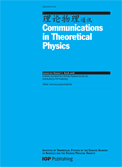
COMMUNICATIONS IN THEORETICAL PHYSICS
Connecting scholars through groundbreaking physics research.COMMUNICATIONS IN THEORETICAL PHYSICS is a distinguished journal published by IOP Publishing Ltd, focusing on the broad and evolving field of theoretical physics. With an ISSN of 0253-6102 and an E-ISSN of 1572-9494, this journal provides a platform for the dissemination of innovative research that contributes to the understanding of complex physical concepts. Situated in the United Kingdom, it has established itself as a pivotal resource from 1996 to 2024, achieving a commendable Q2 ranking in the category of Physics and Astronomy (miscellaneous) for 2023. With a Scopus ranking of #18 out of 81 in its category, demonstrating a 78th percentile, this journal plays a crucial role in enhancing scholarly communication among researchers, professionals, and students alike. Although it does not currently offer Open Access options, the journal's comprehensive scope and commitment to high-quality peer-reviewed research underline its significance in the scientific community, making it an essential reading for anyone engaged in theoretical physics.